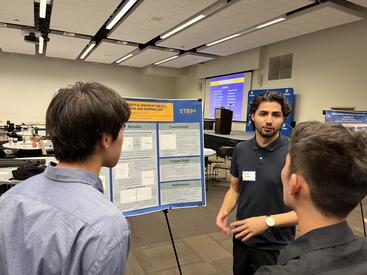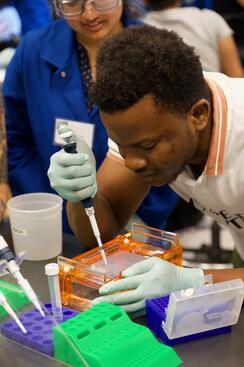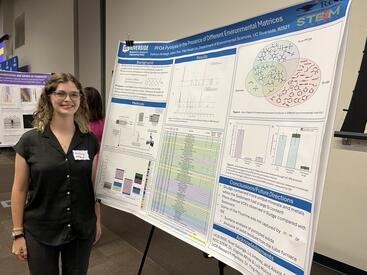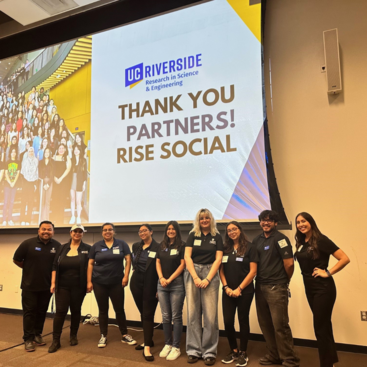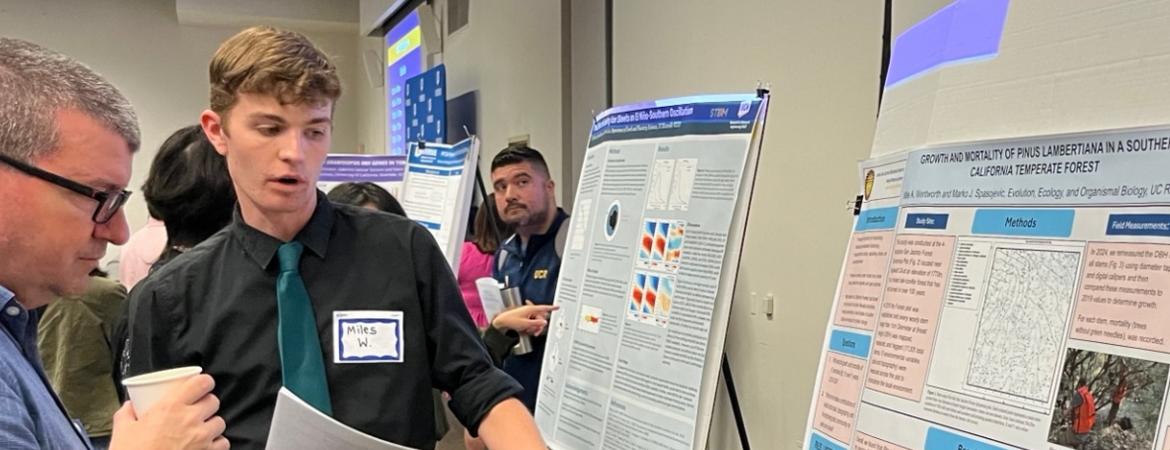
When asked how she's enjoying UC Riverside's Research in Science & Engineering (RISE) program this summer, Riverside City College student Kat McVeigh doesn't hold back.
"It's been a great experience!" she says. "Being in an actual lab [and] getting to know the other people in the lab has been pretty cool. Meeting new people is always really nice!"
RISE is a summer research program designed for rising sophomores, juniors, incoming transfers, and seniors at UC Riverside. Participants work under the supervision of a faculty mentor on a cutting-edge research project, and the program also features faculty mentoring, professional development opportunities and immersive experience in the UC Riverside science community.
The program culminates with an undergraduate research symposium, where participants share their work with the greater UC Riverside community:
This year, the program featured several students from nearby Riverside City College (RCC), students who grew their STEM interests by engaging in RISE's mentored projects and learning more about academic research. RCC students were given the opportunity to participate in RISE programs lasting one or eight weeks.
"It's taught me what goes into research at an academic institution," said Jordan Moreno, a Computer Science major at Riverside City College. "Coming into it, I didn't have any research experience. The biggest skill is learning the entire process of research and learning what goes into exploring the results you get. Results that contradict what you might think should be explained."
Moreno adds, "That explanation is very important because, regardless of the results you get, you can't jump to conclusions."
"We don't have research facilities at Riverside City College, so these research experiences are often the first time these students will be in a research facility," says Dr. Virginia White, Professor and Principal Investigator, STEM Connect Grants at Riverside City College. "RCC students [also] have the opportunity to meet their counterparts at UC Riverside and learn about the student experience."
According to Dr. White, the fact that Riverside City College students also get to interact with graduate students is an important component of the RISE program. "Learning that college isn't necessarily the end point of their education is very eye-opening for some of our students," explains Dr. White. "It is especially beneficial to hear the stories of the graduate students and post docs, particularly at a school as diverse as UC Riverside."
Moreno's RISE project involved working with Professor Jia Gou in the Department of Mathematics on computational models of cell migrations, and studying how different parameters affect the morphology and movement patterns of a cell computationally. "My lab was a little bit different since I'm working with computer models," Moreno explained. "The majority of it is working with simulations, changing parameters, looking at the data, explaining the results and then tweaking and re-doing the process. Throughout the week, I'll meet with my Principal Investigator (PI), and we'll go over my results and what I could do better."
Principal investigators and faculty mentorship played a huge role in the RISE program for Emmatrice Fomumbud, a Riverside City College STEM major who worked with Professor Jim Burnette on DNA barcoding during the one week program. "The [DNA extraction] didn't work on the first day, and we were kind of demoralized," remembers Fomumbud. "But Dr. Burnette wanted us to taste the sweetness of having a good result. He taught us a different method to analyze the DNA, had us do the process again, and it worked!"
The DNA barcoding program allowed participants to investigate whether retail cuts of fish were labeled correctly. "Some of the fish we analyzed were actually mislabeled," explains Fomumbud. "You can read the DNA sequence and be able to tell what type of fish it is...it might look like one kind of fish, but it's actually a different kind."
McVeigh spent her time in RISE in the lab of Professor Ying-Hsuan Lin of the Department of Environmental Sciences, looking at per- and polyfluralkyl substances (PFAs), otherwise known as "forever chemicals," and pyrolyzing them in soil to see how they broke down. "Right now, remediation efforts are the current focus of research for that group of chemicals, because they don't degrade naturally," says McVeigh. "We want to see if thermal treatment is a good course of action for breaking down contamination."
McVeigh credits RISE with teaching her how to perform experiments while simultaneously reviewing her work for mistakes. "One part of [the research project] was gas bag analysis...we would take the soil which we had previously spiked, put it into the furnace, collect it with the gas bag, take it back upstairs and inject it into our machine," McVeigh explains. "We'd be looking at the data we collected to start to understand what we're looking at. That's so we don't get too far without realizing we made a mistake. Reviewing your work at multiple points while you're experimenting is also necessary."
McVeigh also says that her participation in RISE taught her to use "new-to-me" instrumentation and processes she'll likely encounter in other labs during future research projects, like gas chromatography/mass spectrometry (GCMS). "I was learning gas sampling, solid extraction, data analysis, how to make calibration curves and scientific figures, use a fluoride probe, make a poster, and learning how to present that information," she says. "[I was also] learning how to look at previous research to understand current research."
"When Riverside City College students participate in research at UC Riverside, they are doing research at one of the best institutions in the world," says Dr. White. "And UC Riverside is such a diverse university with faculty, post docs and graduate students from all over the world. Some of our RCC students haven't traveled outside of Southern California...to do research alongside a student, post doc, or faculty member who has come to UC Riverside from another country is such an awesome experience."
Dr. White adds, "We really want to showcase to our students that they don't have to be limited by geography. Not to mention that UC Riverside is such a welcoming campus for our students. That's one of the best features of UC Riverside - it's a premiere research institutions that has a small community feel to it."
Both McVeigh and Fomumbud were also surprised by the social aspects of RISE. "I don't think I was expecting everyone in the labs to be so close," admits McVeigh. "There's a lot of camaraderie in the labs. [Once] we were trying to fix a piece of instrumentation...we got a professor to come in and help us. It was really cool to see how, if you're struggling with something, someone else can come in and help you."
"I gained social skills," adds Fomumbud. "I was able to work and create things with a team. The whole [experience] boosted my confidence, both as a student and a person. I was able to work better with a lot of the machines in the lab, and that helped me as a STEM major. We were having fun...talking, getting work done, and getting to know each other. We still learned while having fun."
During RISE, RCC students also interacted with UCR Peer Mentors, current students and recent alumni, many of whom are transfer students and understand the unique obstacles of transferring to UCR. For Moreno, the Peer Mentor meetings provided invaluable support and information about the transfer experience at UCR.
"I think they're really special because they help me to connect with peers that are doing what I want to do," says Moreno, "They've really helped to lead me through this process and show me the way to go. Having a mentor is really important, and I really value those meetings...I've learned a lot from them."
Moreno adds, "They've given me a lot of advice about classes, talking to professors, getting into research, and how to find research you're interested in. I just find that very valuable. Without that, I would be so lost...now I have a really clear idea of what I want to do."
Each year, RISE culminates in a symposium, giving participants the chance to present their work and scientific projects to the UCR community. Students participating in the one week program also have the opportunity to share their work. "While the students do learn some molecular biology skills, they also learn how to write an abstract, analyze data, and develop a presentation," explains Dr. Burnette. "They work in groups on the abstract and presentation, thus gaining teamwork experience. These soft skills are the ones most valuable since they are necessary for any major or career."
Fomumbud credits RISE with helping him conquer his initial apprehension about presenting his findings to his new colleagues. "I was so nervous because I'm not good at talking to strangers...I tried to find confidence in myself, and my colleagues said that I did great," says Fomumbud. "That was a skill I gained, and the next time I find myself giving a presentation, I'll do better."
Fomumbud adds, "Believe in yourself! You may not be the best speaker, but just have fun and enjoy the whole scenario. You're not trying to compete with everyone, you're trying to gain skills and knowledge. Just believe in yourself!"
Students participating in the eight week program were able to participate in the Mentoring Summer Research Internship Program (MSRIP) Symposium on August 16, presenting their research findings to UC Riverside undergraduates, faculty and community members. For McVeigh, the key to a successful presentation is knowing your audience.
"You may have a great spiel worked up, but it might not fit who you're talking to, and in that case, it'll either go over their head or under," says McVeigh. "Knowing who you're talking to is the biggest component...also, having something put together so that if they come up to you and just want to talk to you, you can give them a quick overview and answer additional questions."
According to Moreno, performing research while surrounded by other transfer students was an important experience. "Being surrounded by fellow transfer students is important because I have a different background, and going into research, I might see things differently. Having that environment makes it feel more welcoming and approachable for me."
"RISE is an amazing opportunity for our students," says Robyn Martinelli, Assistant Dean for Development at the UC Riverside College of Natural & Agricultural Sciences (CNAS). "While there are other sources of funding for the program on campus, there are students who’s participation would not be possible without the funds provided by our generous donors. Donor support is crucial to bridging the gap for these deserving students and providing a much needed stipend for summer research as opposed to them taking on a part time summer job."
Martinelli adds, "This past summer, donors funded approximately 30 students. We are actively looking to engage more donors so that we can provide this opportunity to even more deserving students."
Dr. Burnette says he enjoys watching participants make connections between the knowledge learned in class with the real data being generated. "The excitement is generates is infectious and exciting," he says. "It was seeing them realize that they have valuable skills and knowledge they can teach others."
As Moreno, Fomumbud and McVeigh make plans for the next chapters in their academic journeys, they look forward to encouraging fellow transfer students to participate in RISE in the future.
"I think it's a great opportunity to get into research, especially coming from a community college," says Moreno, who plans on studying Physics at UC Riverside. "There's nothing else quite like it! It's a way for community college students to get experience in academic research and see what it's going to be like transferring and pursuing your research interests."
"I was super nervous, but it was the best experience I've ever had," says Fomumbud, who looks forward to studying at the UC Riverside School of Medicine one day. "I was more enthusiastic and have more confidence in myself."
For McVeigh, who plans on pursuing Forensic Chemistry and Criminalistics, the support she and other students received during RISE is a critical factor in the program's success.
"Everyone at RISE is just there to help you, and that's been really cool to see as well." she says. "The amount of support that is there for students."
